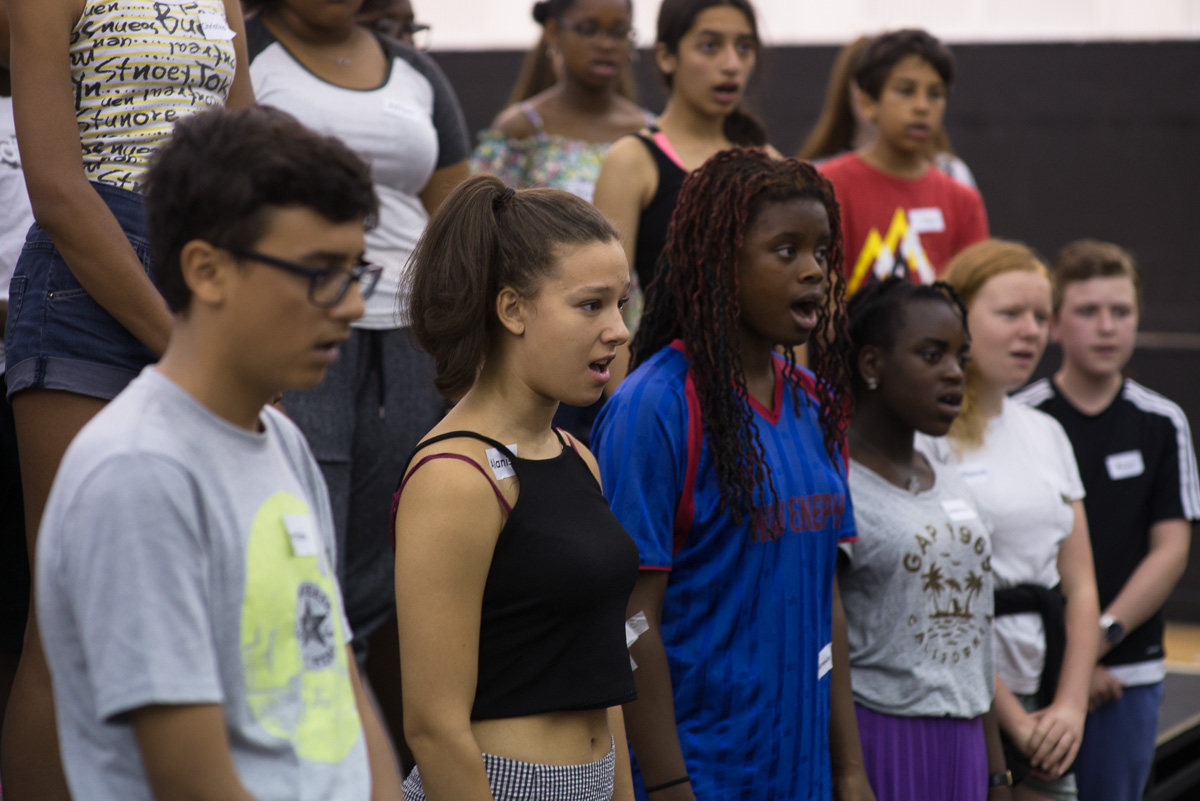[vc_row][vc_column][vc_gallery interval=”3″ images=”101853,101849″ img_size=”large”][vc_column_text]Dressed in t-shirts and sneakers, a group of teens files into a large, white-walled room reminiscent of a school gymnasium. A stage looms over a motley audience of chairs, its walls plastered with handmade collages of redacted newspaper headlines. It could be any summer programme, but when professional opera singer Abigail Kelly begins leading the students in a song on political dissent and dictatorship, it’s clear that they’ve come together to create something novel, provocative and, above all, youth-led.
This is the English National Opera’s (ENO) Baylis Summer Youth Project, which invites students ages 13-18 from around London to create and perform a new piece of music theatre with the support of professional directors, composers and performers. This summer’s programme challenges participants to think critically about issues of censorship, both modern and historical.
The programme responds to Effigies of Wickedness, a collaboration between ENO and the Gate Theatre. Effigies presented songs censored and banned by the Nazis in the 1930s. The youth project features these songs which were, as assistant composer Kelly rehearsed in one scene, “degenerate music […] especially music written by Jewish composers.”
Previous projects have included Other Voices and Speak Some Truth. Like this year’s project, they responded to ENO productions, helping students break down complex topics related to expression and connect them to their own experiences and the present day. Brainstormed by participants and revised by professionals, the script reflects their discussions on censorship. Participants then split into performance and set design groups to put the performance together in late July.
Three performance group members outlined the creative process:
“First we got quotes on censorship and drew a mind map of our ideas” said Alanis.
“We talked a lot about censorship and self-censorship” said Hugo, adding that he hadn’t really thought about self-censorship and how it affects his own interpersonal interactions before the program.
Another participant, Elizabeth, noted “We were also given a poem explaining the fine line of free speech.”
Kelly mentioned that when students came together in mid-July, programme leaders stimulated their thinking about the intersection of free expression and the arts with poetry from persecuted artists like Palestinian poet Darine Tatour. Index CEO Jodie Ginsberg also spoke to the youth company on the programme’s opening day to stimulate discussion on free expression in the arts.
Diversity and teamwork are at the centre of the programme. Choreography is crowd-sourced from the performance group members and all the costumes and stage decorations were built by the set design team. Across the stage, newspaper collages bear hand-painted slogans like “Answer bad ideas with ideas, not censorship” and “Censorship reflects society’s lack of confidence.” Kelly said “We try to give the participants a sense of ownership over what they’ve created.”
Assistant producer Poppy Harrison sees the program as “An opportunity to discuss things in a different way, […] to show every side of the argument. We’ve been careful not to push [the participants] in any direction.”
ENO Baylis’ outreach began during the school year in communities with limited access to the arts. Students in ENO programmes like Opera Squad were especially encouraged to apply to the summer session. Culminating in a performance in front of friends and family, the programme is an extension of ENO’s mission to inspire students to engage with the opera and pressing issues like censorship in the arts.
With participants like Hugo observing that the programme helped him realise that “Creators are people still censored even in our democratic society,” it would seem that ENO is succeeding.
Index on Censorship works extensively on issues of artistic freedom. Find more information here.[/vc_column_text][/vc_column][/vc_row][vc_row][vc_column][vc_basic_grid post_type=”post” max_items=”4″ element_width=”6″ grid_id=”vc_gid:1533049608412-e4e98e79-eb23-5″ taxonomies=”1856, 25039, 13149, 1167″][/vc_column][/vc_row]





